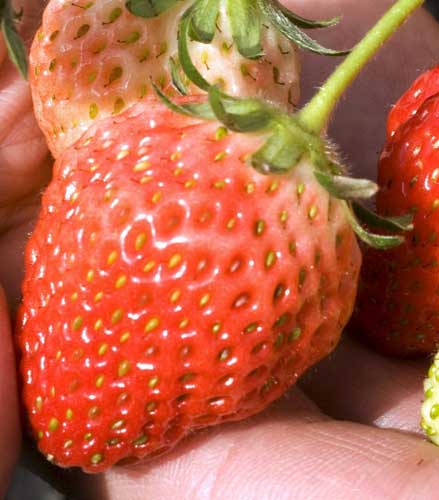Nation's garden centres prepare for strawberry boom
'Edible gardening' is on the rise, survey shows, as people try to beat recession by growing their own

Your support helps us to tell the story
From reproductive rights to climate change to Big Tech, The Independent is on the ground when the story is developing. Whether it's investigating the financials of Elon Musk's pro-Trump PAC or producing our latest documentary, 'The A Word', which shines a light on the American women fighting for reproductive rights, we know how important it is to parse out the facts from the messaging.
At such a critical moment in US history, we need reporters on the ground. Your donation allows us to keep sending journalists to speak to both sides of the story.
The Independent is trusted by Americans across the entire political spectrum. And unlike many other quality news outlets, we choose not to lock Americans out of our reporting and analysis with paywalls. We believe quality journalism should be available to everyone, paid for by those who can afford it.
Your support makes all the difference.Increasing numbers of gardeners and allotment owners are cultivating strawberries and other summer fruits to save money. The Royal Horticultural Society (RHS) reports that 66 per cent of people it surveyed consider melons, strawberries and raspberries as expensive luxury treats, and that 37 per cent are planning to grow their own fruit as a way to save money over the coming year.
The results show a rising trend for "edible gardening": the number of people surveyed who grow their own food has leapt from 29 per cent a year ago to 88 per cent today, according to a study made of visitors to the RHS website.
Sales of seeds for edible plants rose from £87m in 2004 to £118m last year, according to the Horticultural Trades Association. In the same period, sales of fruit trees and plants rose from £23m to £30m.
Seed companies are predicting record sales this year. The boom in strawberry growing serves as a symbol of how the economic climate is fuelling a return to gardening for the table on a scale not seen in decades.
Demand is such that last month the National Trust announced plans to turn over land from sites around the country to people wanting to grow food. The three-year plan will see an area of land capable of producing about £1.5m of fruit and vegetables entrusted to individuals and community groups.
The return to growing vegetables has prepared the ground for the rising numbers now cultivating their own fruit, said Tom Sharples, the marketing manager at Suttons Seeds. "We have seen fruit sales go up by something like 20 per cent in the past year, with the main increases in soft fruits like blackcurrants, redcurrants and strawberries. I think a boom in strawberry growing is inevitable, particularly as people are able to grow varieties that are different to those in the supermarket, which are often criticised for being tasteless."
The seed supplier Thompson and Morgan said it has seen a four-fold increase in fruit plant sales over the past few years. Even B&Q is getting in on the act. Next month it will launch a new range of strawberry plants in time for spring planting; mature plants will have been planted in September last year. The retailer said that people who grow their own produce could save more than £200 a year. "Growing your own fruit and vegetables is a trend which is gaining momentum. Strawberries are a popular choice because they're easy to grow and don't need a lot of space," said Joclyn Silezin, its horticulture buyer.
Helen Bostock, the gardening adviser at the RHS, said: "Strawberries and other soft fruits have become a luxury item in many people's shopping baskets and are getting prohibitively expensive to buy as part of weekly shop.
"We are seeing people who started growing their own vegetables last year now moving on to try soft fruits like strawberries and raspberries."
Join our commenting forum
Join thought-provoking conversations, follow other Independent readers and see their replies
Comments